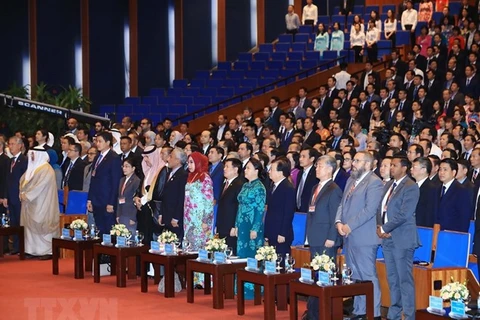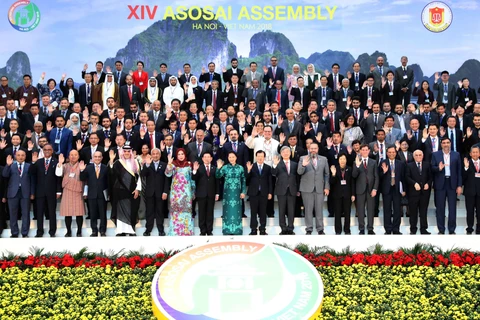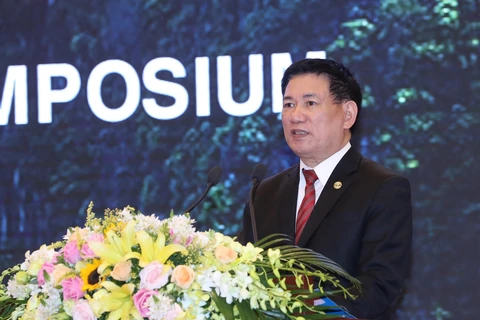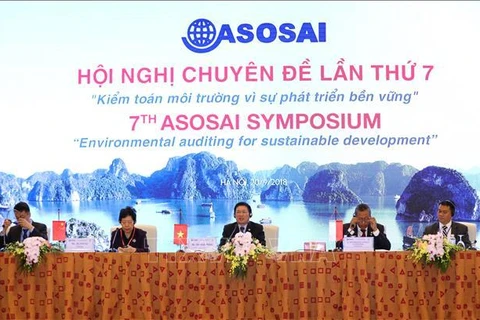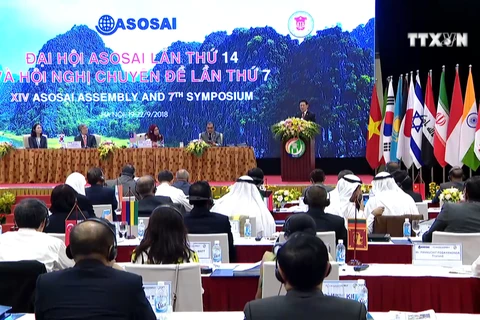 Malaysia Auditor General and Chair of Asian Organisation of Supreme Audit Institutions for the term 2015-18, Dr Madinah Binti Mohamad. (Photo: VNA)
Malaysia Auditor General and Chair of Asian Organisation of Supreme Audit Institutions for the term 2015-18, Dr Madinah Binti Mohamad. (Photo: VNA) Hanoi (VNA) - On the sidelines of the 14th assembly of the Asian Organisation of Supreme Audit Institutions (ASOSAI) in Hanoi, Malaysia Auditor General and Chair of ASOSAI 2015-18 Dr Madinah Binti Mohamad talked to Viet Nam News, an English language newspaper of Vietnam New Agency, about cooperation activities between member countries’ audit agencies and the importance of environmental audit.
Can you tell us about the cooperation programmes between ASOSAI and developing countries in Asia, including Vietnam, especially in terms of capacity building?
In term of the cooperation programmes, ASOSAI has a number of activities with other institutions.
ASOSAI has signed a Memorandum of Understandings (MoU) with other regional groups such as EUROSAI and AFROSAI in order to create regional meetings and mutual agreements emphasising several significant matters such as Sustainable Development Goals (SDGs), IT Audit and Environment Audit. We conduct parallel research to provide insights and foresights of SDGs through the exchange of knowledge, experience, and best practice. Particular attention will be given on the readiness of national system and data aspect as case studies.
Country paper presented in ASOSAI WGEA (Working Group on Environment Auditing) and INTOSAI (International Organisation of Supreme Audit Institutions) WGEA as well as in front of Working Committee Groups. ASOSAI has also contributed several articles in INTOSAI News Brief Greenlines INTOSAI on the parallel audits topics.
ASOSAI has also paid attention to capacity building, for example, ASOSAI training centres in Malaysia, China and India have conducted various Knowledge Sharing sessions, training programmes in blended training method whereby participants will conduct the online course and attend the face to face meeting in many ASOSAI country members.
After the successful term as the chair of ASOSAI, could you share with us your experience in facilitating cooperation between 46 SAI members?
We focused on strategic and effective communication developed among SAI members through online meetings then the important and significant matters will be concluded in the conventional meeting among ASOSAI members.
Through Working Groups such as ASOSAI Working Group in Environmental Audit (WGEA), we could find the best solutions for the auditing environmental issues and challenges faced by ASOSAI Members.
We also have strengthened knowledge through seminars, symposiums, and workshops to increase the competency and skills among the auditors.
We conducted research among our members resulting in recommendations for corrective actions and improvements.
The sharing of lessons learnt from other SAIs was bolstered in order to improve current auditing practices.
The Key Performance Index (KPI) set in the Strategic Plan of ASOSAI is reviewed in order to measure the performance, implementation, and monitoring.
Environment has been a concern in previous terms of ASOSAI. In your opinion, what are the issues ASOSAI should focus in the coming term, chaired by the Vietnam State Audit?
It is observed that many government programmes and activities are carried out on a large scale and involved massive resources. However, these programmes and activities did not take into consideration the environmental consequences or the impacts on the environment are not properly understood and accounted for. Environmental audits highlight the shortcomings and the recommendations help to improve the performance of the Government ministries and departments. For example, though environmental auditing in Malaysia for the past 10 years it is still in the state of development.
ASOSAI has incorporated the importance of auditing and tracking the implementation of United Nations’ Sustainable Development Goals (SDGs) in the Strategic Plan 2016-2021.
Several measures need to be undertaken in order to enhance the quality of environmental audit.
The nature and scope of audit have to be redefined in line with SDGs, while the terms of reference for auditing need to be comprehensive with new approaches and techniques.
There should be an integrated approach to environmental auditing that takes into account all social, economic and environmental aspects for sustainable development.
There needs to be an appropriate mix of auditors with technical skills in view of emerging issues to audit such biodiversity, climate change, and environmental hazards.
Members should cooperate with other SAIs on environmental management, environmental accounting, and environmental performance management, as well as make full use of information technology to facilitate environmental audit.-VNA
VNA
